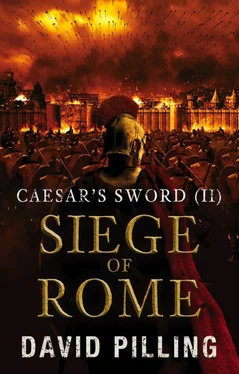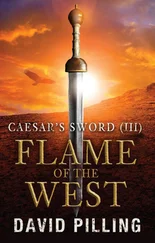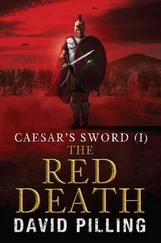David Pilling - Siege of Rome
Здесь есть возможность читать онлайн «David Pilling - Siege of Rome» весь текст электронной книги совершенно бесплатно (целиком полную версию без сокращений). В некоторых случаях можно слушать аудио, скачать через торрент в формате fb2 и присутствует краткое содержание. Год выпуска: 2013, Жанр: Исторические приключения, на английском языке. Описание произведения, (предисловие) а так же отзывы посетителей доступны на портале библиотеки ЛибКат.
- Название:Siege of Rome
- Автор:
- Жанр:
- Год:2013
- ISBN:нет данных
- Рейтинг книги:3 / 5. Голосов: 1
-
Избранное:Добавить в избранное
- Отзывы:
-
Ваша оценка:
- 60
- 1
- 2
- 3
- 4
- 5
Siege of Rome: краткое содержание, описание и аннотация
Предлагаем к чтению аннотацию, описание, краткое содержание или предисловие (зависит от того, что написал сам автор книги «Siege of Rome»). Если вы не нашли необходимую информацию о книге — напишите в комментариях, мы постараемся отыскать её.
Siege of Rome — читать онлайн бесплатно полную книгу (весь текст) целиком
Ниже представлен текст книги, разбитый по страницам. Система сохранения места последней прочитанной страницы, позволяет с удобством читать онлайн бесплатно книгу «Siege of Rome», без необходимости каждый раз заново искать на чём Вы остановились. Поставьте закладку, и сможете в любой момент перейти на страницу, на которой закончили чтение.
Интервал:
Закладка:
Belisarius took one look at the rebel defences and shook his head.
“It won’t do,” I heard him say to Bessas, and he was right. A frontal assault against the rebels would be suicide, so he ordered the army to pitch camp near the banks of the river.
All through that long, hot spring day the rival hosts stood and stared at each other. Belisarius had placed his camp between Stoza’s men and the city, cutting off their line of supply. His hope was that the rebels would soon run short of rations, and would have to give battle or starve.
Our own rations were limited, since we had left Carthage in haste. Belisarius solved that problem by leading three hundred of his cavalry into Membresa and forcibly taking food from the citizens. He promised to pay when the rebels were defeated and North Africa once again a Roman province, which must have been scant comfort to those he stole from.
Still the rebels would not move. Night came on, and I did my shift on watch, huddled up in my cloak and field blanket as I watched the fires on the hill. If Stoza had been a bold man, he might have tried a night assault. Belisarius was not to be taken unawares, and had half his men stand to arms while the others slept. At one hour past midnight, those who slept were shaken awake and placed on guard, while their comrades sank gratefully to rest.
I was booted awake the following morning by a grinning captain. His name was John Troglita. Like Bessas, he was another Thracian of mixed blood, and a veteran of the recent wars in Africa and Mesopotamia. He would go on to achieve general rank, but I chiefly remember him for possessing the ugliest face I have ever seen, something like a cross between a debauched wolf and a plague victim.
“Up, Briton,” he snarled, jerking his thumb in the direction of the hill, “those bastards have finally decided to advance.”
I rose, bucking on my sword-belt and straining to see the enemy. A strong wind had blown up during the night, whipping dust and sand across the plain.
“Damn it,” I muttered, blinking and holding my arm before my face. The wind showed no signs of dying down, and an eerie howl rolled across the desert landscape, like a horde of distant wolves moaning their death-songs.
I glimpsed a multitude of spears and banners moving down from the hill. The rebels marched in poor order, especially the Moorish cavalry and camel-riders on the flanks, who had little notion of military discipline. Our Roman mutineers were easy to spot. Their infantry marched in column in the centre, with auxiliary cavalry guarding their flanks and rear.
Anger coursed through me as I watched them advance. The mutineers were still flying Roman standards, as though they were the loyalists and we the rebels.
The screech of bucinae called me to my duty. I scrambled aboard my horse and steered her towards the great imperial standard, where Belisarius was forming up his guards. He was already mounted and armed, and shading his eyes to observe the movements of the enemy across the dust-whipped plain. Photius was at his side.
Our garrison troops were a shade slower to form into line of battle, though Bessas and Troglita and other officers rode among them, screaming and striking at the laggards with iron-tipped truncheons. I galloped past the chaos and took my place in the front rank behind Belisarius.
My heart shivered at the sight of the grim mass of steel and flesh tramping towards us. The enemy numbered some eight to ten thousand, and my only solace was that Belisarius had faced worse odds before and triumphed.
I expected the rebels to march straight on and roll over our pathetic array, but instead their forward squadrons stumbled to a halt. A smile spread across my face as I watched their officers galloping to and fro, shouting and gesticulating at each other. Seeds of confusion were sown in the rebel ranks as their infantry shuffled this way and that, colliding with their comrades. War-drums and bucinae sounded a stream of conflicting orders.
Stoza was attempting to arrange his army into one long column, so their centre could engage us while the wings wrapped around our flank and rear. It wasn’t a complex maneuver, but at least half his force was made up of ill-trained levies and skirmishers.
The effort proved disastrous. With the exception of the Roman troops, Stoza’s entire forward line collapsed into a mob of baffled and angry men. Belisarius saw the opportunity and raised his spatha as the signal to charge.
I had taken part in many cavalry exercises outside the walls of Constantinople, learning to steer a horse with my knees while handling sword and shield, javelin and bow. I fought as part of a cavalry squadron at Ad Decimum, and witnessed the shattering assault of the bucelarii at Tricamarum, but Membresa was the first time I rode in a cavalry charge.
My sluggish blood quickens as I recall the excitement and urgency, the bunch and flow of my horse’s muscles under me as I spurred her into a full-hearted gallop. The shriek of the bucinae, the roar of the men around me, the dust kicked up by hundreds of hoofs, the howl of the gale sweeping across the plain.
As we thundered into a gallop the rebel line vanished, concealed behind billowing clouds of dust and sand.
Instinct and training took over. Belisarius had drilled his guards in the use of the kontos, a slender four-metre long lance, wielded in both hands for greater thrust. The heavier shields carried by our garrison troops were a needless encumbrance to men carrying such a weapon, so instead we wore small round shields strapped to our left forearms.
I held my kontos at a low angle across my horse’s neck. In this position it would outreach the weapons of the rebel infantry, and hopefully skewer any man foolish enough to hold his ground against me. Some of my comrades held their lances high, to strike and stab downwards at the enemy.
We charged blindly through the storm. The gold and silver figures of Belisarius and Photius disappeared, swallowed up inside a wall of dust. We roared in fury and drove our horses to the limit, determined not to lose sight of our beloved general for long.
The muffled yell of a trumpet sounded away to my right. Horsemen exploded into view, armed with javelins and oval shields. Stoza had thrown in his mutineer cavalry to meet our charge.
For the first time I found myself facing Romans in battle. I had no time to dwell on the irony of that, but switched my grip on the kontos, lifting it high as a horseman galloped straight at me. He hurled his javelin, but it was a poor throw. The slender dart bounced harmlessly off the boss of my shield and span away.
The impetus of his charge drove him onto my lance. I stabbed at his head, and the wickedly sharp steel tip took him in the throat and thrust out the back of his neck. I was trained for this, and gave the kontos a sharp twist, withdrawing the tip even as the mutineer fell from his saddle, blood pumping from the neat hole in his neck.
Now all our ranks were broken up, the fight dissolved into dozens of individual combats. Dust flew into my eyes. A shape hurled itself at me, screaming like a devil, and I felt something hammer against my ribs. The pain made me cry out and double over. A javelin had hit me in the side, but my fine scale armour had preserved me from worse than bruises.
My kontos was virtually useless in this sort of close fighting. I hurled it away and ripped out Caledfwlch, feeling my courage return as my fingers closed around the worn ivory grip.
Most of my comrades fought with spathas, long swords with a heavy chopping edge. Caledfwlch was a gladius, a much shorter and rather antiquated weapon, intended for stabbing rather than hacking with the edge. Many of the guards thought me vain for persisting with such a relic, but I found the shorter blade gave me an advantage at close quarters.
Читать дальшеИнтервал:
Закладка:
Похожие книги на «Siege of Rome»
Представляем Вашему вниманию похожие книги на «Siege of Rome» списком для выбора. Мы отобрали схожую по названию и смыслу литературу в надежде предоставить читателям больше вариантов отыскать новые, интересные, ещё непрочитанные произведения.
Обсуждение, отзывы о книге «Siege of Rome» и просто собственные мнения читателей. Оставьте ваши комментарии, напишите, что Вы думаете о произведении, его смысле или главных героях. Укажите что конкретно понравилось, а что нет, и почему Вы так считаете.












